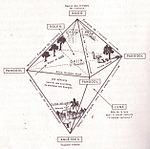Diiney Séeréer


Diiney Séeréer (mba A ƭat Roog ci baati Séeréer), moi diiney Séeréer bu njëkk. Ay Ceddo lañu woon. Tay nag dugg nañu lislaam (yoonu murit), walla diiney nasaraan ca Siin (Joal-Fadiouth). Nasaraanalkat yi yu tubaab yi ñoo leen dugal ci diine jooju. Am na Séeréer ñu barry ñu tey ci diiney A ƭat Roog. Roog moi Yalla ci baati Séeréer.
Lëkkalekaay yu biti
[Soppi • soppi gongikuwaay bi]- ↑ Gravrand, Henry, "Pangool", p 216
- American Society of African Culture: African forum, Volumes 3-4. American Society of African Culture., 1967. p. 85
- Becker, Charles: Vestiges historiques, trémoins matériels du passé clans les pays sereer, Dakar. 1993. CNRS - ORS TO M
- Berg, Elizabeth L.: & Wan, Ruth, Cultures of the World: Senegal, Benchmark Books (NY), 2009, p.144, ISBN 978-0-7614-4481-7
- Biblical Archaeology Society: Bible review, Volumes 18-19. Published by: Biblical Archaeology Society, 2002. ISBN 0-9677901-0-7
- Bressers, Hans & Rosenbaum, Walter A.: Achieving sustainable development: the challenge of governance across social scales, Greenwood Publishing Group, 2003, p. 151, ISBN 0-275-97802-8.
- Dion, Salif: L’Éducation traditionnelle à travers les chants et poèmes sereer, Dakar, Université de Dakar, 1983, p. 344
- Diop, Cheikh Anta: The African origin of civilization: myth or reality, L. Hill, 1974, p. 9, 197, ISBN 1-55652-072-7
- Diouf, Niokhobaye: Chronique du royaume du Sine, (suivie de Notes sur les traditions orales et les sources écrites concernant le royaume du Sine par Charles Becker et Victor Martin (1972)): Bulletin de l'IFAN, tome 34, série B, no 4, 1972, p. 706-7 (p. 4-5), p. 713-14 (p. 9-10)
- Dupire, Marguerite, Les "tombes de chiens : mythologies de la mort en pays Serer (Sénégal), Journal of Religion in Africa, 1985, vol. 15, fasc. 3, p. 201-215
- Fall, Papa Oumar: « The ethnolinguistic classification of Seereer in question », in Altmayer, Claus / Wolff, H. Ekkehard, Les défis du plurilinguisme en Afrique, Peter Lang, Frankfurt am Main, Berlin, Bern, Bruxelles, New York, Oxford, Wien, 2013, p. 47-60
- Faye, Louis Diène, Mort et Naissance le monde Sereer, Les Nouvelles Éditions Africaines, 1983, p. 9-44, (ISBN 2-7236-0868-9)
- Fondation Léopold Sédar Senghor: Éthiopiques, Issues 55-56. 1991. p. 62-95
- Galvan, Dennis Charles: The State Must Be Our Master of Fire: How Peasants Craft Culturally Sustainable Development in Senegal. Berkeley, University of California Press, 2004, p. 108-304, (ISBN 0-520-23591-6)
- Gastellu, Jean-Marc (with ref to notes of : M. Sambe - 1937): L'égalitarisme économique des Serer du Sénégal, IRD Editions, 1981. p.130. (ISBN 2-7099-0591-4)
- Gravrand, Henry: La civilisation sereer, vol. I : Cosaan: les origines, Nouvelles éditions africaines, Dakar, 1983
- Gravrand, Henry, La civilisation sereer, vol. II : Pangool, Nouvelles éditions africaines, Dakar, 1990, p. 9-77, (ISBN 2-7236-1055-1)
- Kalis, Simone: Médecine Traditionnelle, Religion et Divination Chez les Seereer Siin du Sénégal, La Coonaissance de la Nuit. L'Harmattan, 1997, p. 25-60, (ISBN 2-7384-5196-9)
- Kellog, Day Otis & Smith, William Robertson: The Encyclopedia Britannica: latest edition. À dictionary of arts, sciences and general literature, Volume 25, p. 64. Published by Werner, 1902.
- Klein, Martin A: Islam and Imperialism in Senegal Sine-Saloum, 1847-1914, Edinburgh At the University Press (1968)
- Krzyżaniak, Lech; Kroeper, Karla & Kobusiewicz, Michał: Muzeum Archeologiczne w Poznaniu. Interregional contacts in the later prehistory of northeastern Africa. Poznań Archaeological Museum, 1996, p. 57-58, (ISBN 83-900434-7-5)
- LA PIAILLÉE No. 141. avril 2006. Dakar
- Madiya, Clémentine Faïk-Nzuji: Canadian Museum of Civilization, Canadian Centre for Folk Culture Studies, International Centre for African Language, Literature and Tradition (Louvain, Belgium), Tracing memory: a glossary of graphic signs and symbols in African art and culture. Canadian Museum of Civilization, 1996. p. 5-115, (ISBN 0-660-15965-1)
- Ndiaye, Ousmane Sémou: Diversite et unicite Sereres: L’exemple de la Région de Thies. Ethiopiques numéro 54, revue semestrielle de culture négro-africaine, Nouvelle série, volume 7 2e semestre 1991
- Niang, Mor Sadio: IFAN. Ethiopiques numéro 31 révue socialiste de culture négro-africaine 3e trimestre 1982.
- Sarr, Alioune, Histoire du Sine-Saloum (introduction, bibliographie et notes par Charles Becker), [in] Bulletin de l'IFAN, tome 46, série B, nos 3-4, 1986-1987 p. 31-38
- Searing, James F.: « Conversion to Islam. Military Recruitment and Generational Conflict in a Sereer-Safin Village (Bandia) », Journal of African History, 2003, n° 44, p. 73-94.
- Seck, A., Sow, I., & Niass, M., Senegal, [in] The biodiversity of traditional leafy vegetables, p. 85-110.
- Sell, Madlen: « La dation du nom et autres rites de passage chez les Seereer Siin du Sénégal », Le Journal des Psychologues, 2014, n° 320, p. 74-77.
- Thiaw, Issa Laye: Myth de la Creation du monde selon les sages Seereer. p. 45
- Thiaw, Issa Laye: La femme Seereer (Sénégal), L'Harmattan, Paris, septembre 2005, p. 169, (ISBN 2-7475-8907-2)
- Thiaw, Issa Laye: La religiosité des Seereer, avant et pendant leur islamisation, in Éthiopiques, no. 54, volume 7, 2e semestre 1991
- Tiziana Bruzzone, Virginia: La royauté de la mer à Fadiouth : aspects de la religion traditionnelle seereer, Sénégal, L'Harmattan, Paris ; IFAN, Dakar, 2011, 230 p. (ISBN 978-2-296-54888-6)
- Wade, Amadou: Chronique du Walo sénégalais (1186-1855). B. Cissé trans. V. Monteil. Bulletin de l'IFAN, Series B, Vol. 26, no. 3/4.1941, 1964